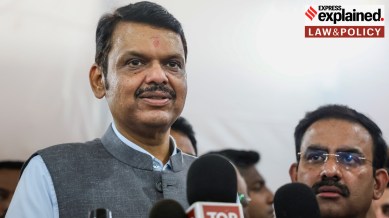The Maharashtra Legislative Assembly on Thursday passed by a voice vote the stringent Special Public Security Bill, 2024 that seeks to tackle “unlawful activities of left-wing extremist organisations”.
The Bill criminalises a wide range of actions – from interference with the maintenance of public order and administration of the law, to generating fear and apprehension in the public, and encouraging or preaching disobedience of the law.
It also prescribes penal consequences for alleged offences, including forfeiture of property even before a trial is conducted and the accused is found guilty.
Concerns have been raised that the overbroad definitions in the Bill and the wide powers that it confers on the police could possibly be misused.
The Bill will now be introduced in the Legislative Council where it is expected to pass. It will then be sent to the Governor for his assent, following which it will become law.
Bill and its journey
An earlier version of the Bill was introduced in the Assembly in July 2024, on the last day of the monsoon session. The state went to polls in November, and the Bill effectively lapsed. It was introduced again in December last year, after a joint committee cleared the Bill.
In its Statement of Objects and Reason, the Bill states that it seeks to tackle “the menace of naxalism”.
Story continues below this ad
“The spread of active frontal organizations of the Naxal groups gives constant and effective support in terms of logistics and safe refuge to their armed cadres. The seized literature of Naxals shows “safe houses” and “urban dens” of the Maoist network in the cities of the State of Maharashtra,” the Bill states.
The government can declare an organisation as “unlawful”, and the Bill prescribes penalties for individuals associated with such unlawful organisations. This is similar to how the Unlawful Activities Prevention Act, 1967, operates. However, the provisions of the Maharashtra Bill cover a wide range of “unlawful activities”.
What the Bill prescribes
The Maharashtra Bill’s definition of unlawful activity includes:
1. Interference with the maintenance of public order, or with the administration of law;
2. Overawing a public servant by criminal force;
3. Indulging in or propagating, acts of violence, vandalism, or other acts generating fear and apprehension in the public;
Story continues below this ad
4. Indulging in or encouraging the use of firearms, explosives, or other devices, or disrupting communications by rail, road, air, or water;
5. Encouraging or practising disobedience to established law and its institutions.
The Bill prescribes punishment ranging from two years to seven years of jail term, along with fines for (i) for being a member of an unlawful organisation, (ii) when not a member, for raising funds for an unlawful organisation, (iii) for managing or assisting in managing an unlawful organisation and, (iv) for committing an “unlawful activity”.
Offences under the proposed law are cognizable, which means arrests can be made without a warrant, and are non-bailable.
Story continues below this ad
The government’s declaration of an organisation as unlawful has to be confirmed by the Advisory Board consisting of “three persons who have been or are qualified to be” a judge of a High Court.
The Bill also prescribes some serious pre-trial consequences against the property of the accused.
For instance, when an organisation has been declared “unlawful”, the District Magistrate or the Police Commissioner may take possession and evict individuals from “any place which in his opinion is used for the activities of such unlawful purpose of organization”.
This forfeiture is permitted in the Bill with a notice of 15 days to the affected party. The Bill also states that “where any such place contains any apartment occupied by women or children, reasonable time and facilities shall be provided for their withdrawal with least possible inconvenience”. This means that forfeiture could include residence of an accused.
Story continues below this ad
The Bill states that the affected party can move the High Court within 30 days of forfeiture.
Concerns about the Bill
Stringent legislation such as the UAPA and the Prevention of Money Laundering Act (PMLA) have features similar to the Maharashtra law.
In the UAPA, unlawful activity includes “cession or secession” activities; actions that “disrupt the sovereignty and territorial integrity of India” and “cause disaffection against India”. However, this is a higher threshold for terror-like activities.
Story continues below this ad
Maharashtra’s proposed Bill contains loosely worded definitions for unlawful activity such as “practising disobedience” or “disrupting communication by road”, which have raised fears that it could criminalise ordinary, valid acts of protest or dissent against the state.
In the landmark 1962 Kedar Nath Singh case, the Supreme Court, while upholding the sedition law, drew a line – that speech or criticism of the government cannot be labelled ‘sedition’ unless it is accompanied by an incitement or call for violence.
In the PMLA, there are provisions for attachment of property. However, that is limited only to property that is considered “proceeds of crime”. A quasi-judicial body, the PMLA Appellate Tribunal, vets the attachment made by the Enforcement Directorate.
Significantly, the UAPA and PMLA are extraordinary laws, which are exceptions to ordinary criminal laws.
Story continues below this ad
Ordinary criminal laws have constitutional safeguards, such as the presumption of innocence until proven guilty, and the burden of proof lying with the state to establish the crime against the accused.
In special laws, for high-stakes offences, these principles are diluted, but not for every criminal law.
